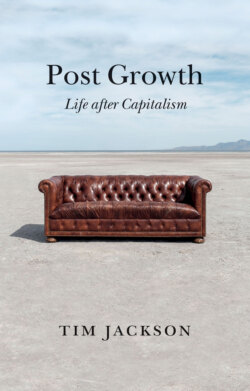Читать книгу Post Growth - Tim Jackson - Страница 22
Serious money
ОглавлениеTo answer these questions, we have to rewind further. The immediate post-war period was a dry one for the ideological right, for some of the reasons that Wolf identified. The post-war consensus was forged from the harsh lessons of the Great Depression. It was dominated by the economics of John Maynard Keynes. The state has an irreducible role in the economy, said Keynes. Deficit spending by government was the only thing that saved the US economy from ruin. There was no room here for the free-marketeers.
But then came the 1970s oil crises. Against fast-rising resource prices, the West found itself ill prepared. The deficit spending of the 1930s proved ineffectual against the conditions of ‘stagflation’. Worse, it gave rise to a deepening public debt which had repercussions beyond the economy itself. Here was the opportunity that the neoliberals had been waiting for. They seized their moment in the sun to precipitate a sharp shift towards the political right.18
The new politics offered ‘freedom’ as the ultimate arbiter of human affairs. The monetarists set about deregulating the economy and privatizing markets. Lowering interest rates. Loosening financial regulations. The so-called ‘Big Bang’ was brilliantly satirized in Serious Money, a 1987 play by the writer Caryl Churchill. Written in rhyming verse and played at breakneck speed, it offered ‘a savage breathless indictment of high finance and its greedy, cut-throat culture’. The performance was a huge hit – even amongst those it satirized. At one point in the play, one of the most aggressive traders insists:
We’re only doing just the same
All you bastards always done
New Faces in your old Square Mile
Making money with a smile
Just as greedy, just as vile.19
It was a clever echo of a common justification for this new cut-throat capitalism. Money makes the world go around. Same as it ever was. Only now the culture of greed was sanctioned by a state which was trying to remove itself from the fray by privatizing everything. When the show transferred to Wyndham’s Theatre in London, the newly privatized British Telecom notoriously refused to provide telephones for the production, saying: ‘This is a production with which no public company would wish to be associated.’ The play is now a set text for high-school exam courses.20
